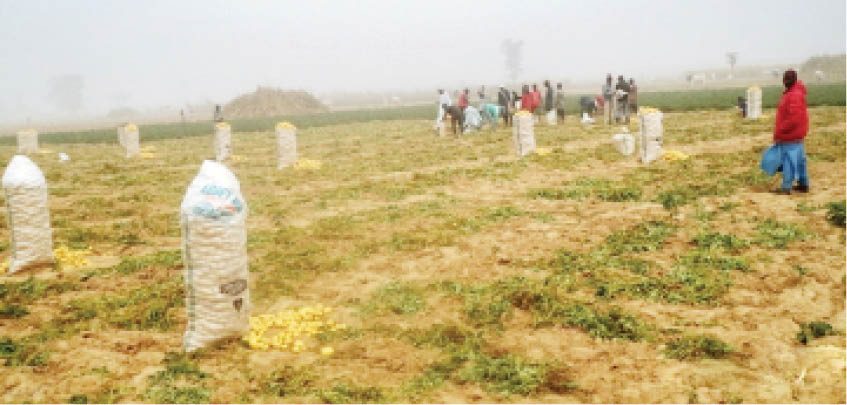Katsina potato farmers devise storage method as production increases
Farmers and merchants of Irish potato in Katsina State have devised a local way of storing the commodity for future sales. The crop, which is produced between the months of December and March, have over the years witnessed market glut at the peak of harvest due to its perishable nature. How Boko Haram survives on […]

An Irish potato farm at Gwamutsawa in Bakori LGA, Katsina State
Farmers and merchants of Irish potato in Katsina State have devised a local way of storing the commodity for future sales.
The crop, which is produced between the months of December and March, have over the years witnessed market glut at the peak of harvest due to its perishable nature.
- How Boko Haram survives on weapons stolen from Nigerian military
- World book day: Centre donates 500 children books to Kano library
Lawal Musa Kanawa, a farmer and merchant, said those that stored potato this year with the new method are making a lot of money, especially with the ongoing Ramadan fasting.
“The highest demand period for Irish potato is the month of Ramadan, which is why some of us copied the strategy of Jos farmers by storing them in a ventilated room on top of sand spread on the floor. The sand prevents them from massive rot.
“The storing method pays because we now sell a bag of the commodity for not less than N36,000 as against the N15,000 and N20,000 we sold it two months back,” he said.
According to him, “I can bet you that Irish potato worth N100m was produced along Gwamutsawa/Kanawa axis in Bakori LGA and God so kind, it is in that area that the proposed Jare Dam is sited.
“Before now, we only harvest and sell the entire potato produced at once no matter the market price; a situation that resulted in market glut of the commodity most times.”
Another farmer, Sani Shu’aibu, said other problems they experience every year were high cost of seedlings and that of NPK 15:15:15 fertilizer for the production of the crop.
“Jos, in Plateau State, is our only source of seeds because they produce them during the rainy season but because there are merchants who source the seeds from villages in Plateau State, the cost of the seeds remains high now,” he said.
According to him, a 100kg bag costs between N40,000 and N70,000, depending on the variety.
He said the ban on NPK 15:15:15 fertilizer had recently escalated its price, adding that it is practically adjudged to be suitable for potato production but many farmers can’t afford it at the rate of N18,000.
He recalled that it was because of the absence of super phosphate fertilizer suitable for tubers that they adopted NPK 15:15:15 since the cheaper NPK 20:10:10 was only suitable for maize, sorghum and other cereals.
Sani Shu’aibu expressed confidence that Jare dam, if completed, would make Bakori LGA and its environs an irrigation hub, especially in the production of Irish potato, tomato, cabbage, cucumber, wheat and the likes.
Malam Aliyu Musbahu, an agricultural economist, said with the rapid expansion of Irish production in Katsina State, government needs to invest in it to boost the production to export level.
“All we got as far as Irish potato production is concerned in Katsina State this year was entirely from the farmers’ efforts. Government needs to come in, especially in the provision of relevant fertilizer like super phosphate or NPK 15:15:15, seedlings, pesticides and storage facilities. Like rice, potato has a great potential,” he said.
